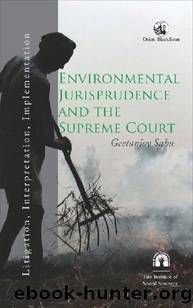Environmental Jurisprudence and the Supreme Court by Geetanjoy Sahu

Author:Geetanjoy Sahu [Sahu, Geetanjoy]
Language: eng
Format: epub
Publisher: Orient BlackSwan Private Ltd.
Published: 2018-06-12T00:00:00+00:00
Evolution of Environmental Laws and Policies
While administering environmental justice, the Supreme Court has evolved certain principles and doctrines within and, at times, outside the framework of existing environmental laws. Environmental principles, such as the polluter pays principle, the precautionary principle and the public trust doctrine have been adopted by the Court in its decision making process for protecting the environment from further degradation and for improving it as well. These principles have been developed on the basis of various international agreements and conferences aimed at controlling and preventing further environmental degradation.
Drawing inferences from these international environmental principles, the Court has, on occasion, applied various principles to resolve many domestic environmental problems. For example, the polluter pays principle was invoked by the Supreme Court in Indian Council for Enviro-Legal Action v. Union of India (the Bichhri village industrial pollution case). While delivering the judgment on 13 February 1996, the judges observed that:
we are of the opinion that any principle evolved in this behalf should be simple, practical and suited to the conditions obtaining in this country. Once the activity carried on is hazardous or inherently dangerous, the polluter carrying on such activity is liable to make good the loss caused to any other affected party by the polluterâs activity, irrespective of the fact whether the polluter took reasonable care while carrying on his activity (1996 [3] SCC 215).
In this case, the Court stated that the polluter pays principle placed absolute liability upon the polluter for whatever harm they had caused to the environment and that this liability extended not only to the compensation for victims of the pollution but also the cost of repairing the environmental degradation caused. Subsequently, the polluter pays principle, as interpreted by the Court, has been recognised as a fundamental component of the governmentâs environmental policy towards preventing and controlling pollution.18
The precautionary principle, as applied by the Court in its judgment dated 28 August 1996 in Vellore Citizensâ Welfare Forum v. Union of India made it obligatory for every developer, industry and governmental agency to anticipate, prevent and attack the causes of environmental degradation (AIR 1996 SC 2716). The Court also observed that if there were any potential threats of serious and irreversible damage, the lack of scientific certainty should not be used as a reason for postponing measures to prevent environmental degradation. Finally, it emphasised that the onus of proof would be on the actors or the industrialists to show that their actions were environmentally benign. The precautionary principle had also been emphasised in cases such as M. C. Mehta v. Union of India and A. P. Pollution Control Board v. M.V. Nayudu.19
To further justify, and perhaps enforce, the state initiative to conserve natural resources, the Court also enunciated the doctrine of public trust, thereby making conservation obligatory on the part of the state. The public trust doctrine was referred to by the Court in the M. C. Mehta v. Kamal Nath case in its 13 December 1996 judgment (1997 [1] SCC 388). The doctrine extends
Download
This site does not store any files on its server. We only index and link to content provided by other sites. Please contact the content providers to delete copyright contents if any and email us, we'll remove relevant links or contents immediately.
Future Crimes by Marc Goodman(3001)
American Kingpin by Nick Bilton(2970)
The Meaning of the Library by unknow(2067)
Inside the Middle East by Avi Melamed(1939)
On Tyranny by Timothy Snyder(1858)
Why Nations Fail: The Origins of Power, Prosperity, and Poverty by Daron Acemoglu & James Robinson(1787)
Living Silence in Burma by Christina Fink(1728)
Putin's Labyrinth(1656)
The Mastermind by Evan Ratliff(1591)
Think Like a Rocket Scientist by Ozan Varol(1396)
Law: A Very Short Introduction by Raymond Wacks(1383)
The Smartest Kids in the World by Amanda Ripley(1366)
Leadership by Doris Kearns Goodwin(1348)
The Rule of Law by Bingham Tom(1318)
A Dirty War by Anna Politkovskaya(1312)
It's Our Turn to Eat by Michela Wrong(1301)
Philosophy of law a very short introduction by Raymond Wacks(1297)
Social Media Law in a Nutshell by Ryan Garcia & Thaddeus A Hoffmeister(1248)
Civil Procedure (Aspen Casebooks) by Stephen C. Yeazell(1171)
